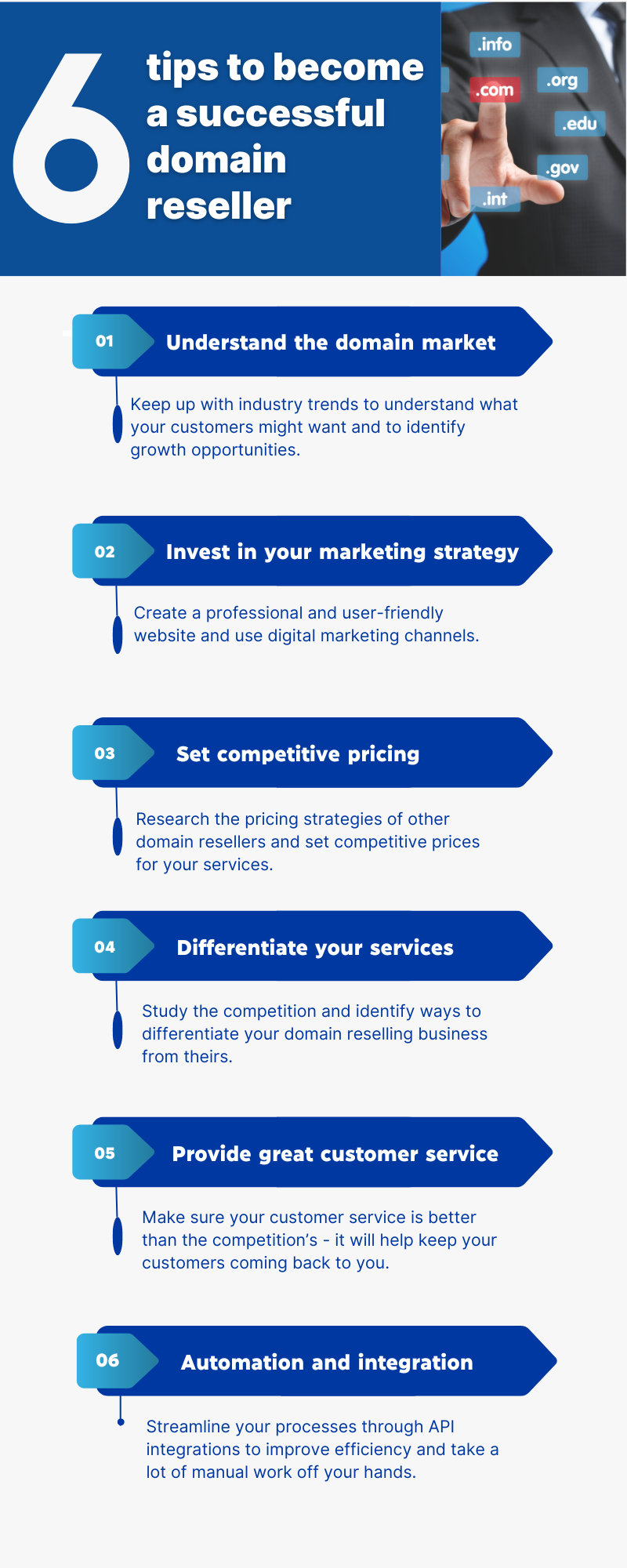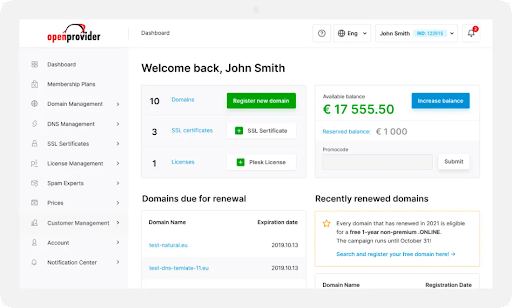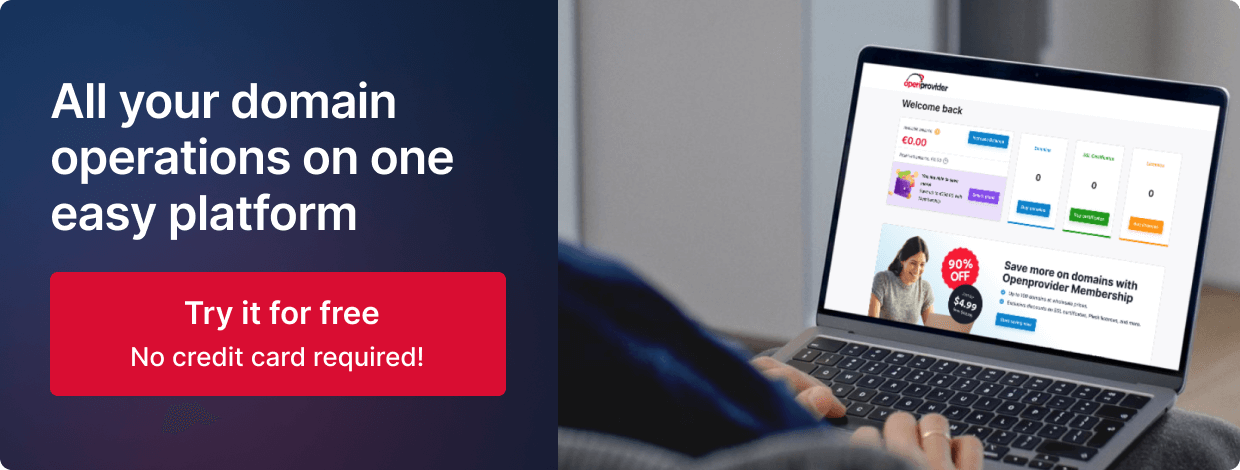The digital world is crowded and competitive, but the domain industry is full of opportunities.
If you want to succeed as a domain reseller in 2026, you need to be strategic, resourceful, and ready to hustle.
Most domain resellers can be categorized as either web hosters, web developers, or domain investors. In this article, we’ve shared our insider tips on launching your business or side venture in all three – without burning through your budget or your patience.
Life as a domain reseller
Domain resellers are individuals and businesses that offer domain registration and management services to their customers, while not being domain registrars themselves.
Most domain resellers also sell other products and services besides domains, usually in the realm of digital services.
Process of domain reselling
You can become a domain reseller by partnering with a domain registrar and buying domain names in bulk to resell to other individuals and businesses.
Domain reselling means working with a registrar that operates with the different registry operators that control TLDs.
Now, you could skip the middleman and directly do business with the registry operators, but that would mean a whole lot of extra work: thousands of TLDs exist, so arranging price deals, promotions, and so on, you wouldn’t have much time left to sell the actual domain names.
Who can be a domain reseller?
In theory, anyone can be a domain reseller, although domain resellers commonly run businesses in web, email, and cloud hosting.
Others provide marketing, SEO, or web design services. Many domain resellers are freelancers or run small agencies, but large enterprise companies can also be considered domain resellers if they resell domain names from a domain registrar.
Starting a web hosting business: compete smarter, not harder
Web hosting is a tough game. The big players dominate, and new companies struggle to break through. If you’re serious about this, you need a clear plan and a way to stand out.
- Build a solid business model: how much do your services cost? What’s your profit margin? How long will it take to break even? If you don’t have answers to questions like these, rethink your approach.
- Differentiate yourself: why should someone choose you over a big player? Do you offer better support? More flexibility? Faster speeds? Identify your edge and own it.
- Think about integration with an existing business: if you already offer a service like marketing services, web design, or PC repair, adding hosting could be a natural extension.
- Know your costs before you commit: renting a server, software licenses, WHMCS, bookkeeping – it adds up fast. Write down every expense before you take the plunge.
- Sales come first: the hardest part isn’t the tech – it’s getting clients. Set up referral programs for your existing customer base, attend industry events like Domain Summit and WordCamp, and connect with potential customers at networking events.
- Start lean, scale smart: don’t sink money into an expensive dedicated server if you don’t have any customers yet. Start with a reseller hosting plan or a solid VPS, and upgrade only when demand justifies it.
- Don’t underestimate support demands: clients expect 24/7 reliability and personalized support. If you can’t handle that, consider a different business model.
Web development: the practical approach
If you build websites, offering hosting and domains can boost your revenue and customer loyalty. But there’s a catch: DIY website builders like Wix and Squarespace are grabbing market share fast, so you need to stand out.
- Target the right businesses: Many small businesses turn to DIY platforms. Mid-sized and large companies are often still looking for professional solutions and the ones you should be targeting.
- Go local: Try cold-calling or emailing businesses in your area that don’t have a website or an outdated one. Offer them a complete package: domain, hosting, and design.
- Start with a reseller hosting plan: Keep costs low by using a reseller plan until your client base justifies a bigger investment.
- SEO matters: Clients don’t just want a nice-looking website; they want visibility. SEO knowledge is a game-changer when selling web development services.
- Show, don’t tell: To win clients, demonstrate why your design brings in more traffic and conversions than what they currently have. Creating simple mockups can help potential clients visualize the improvements.
- Recurring revenue is key: You don’t make the bulk of your revenue from building websites – you make it from maintaining them. Never just sell a website and walk away. Include hosting, maintenance fees, and add-ons like SSL certificates to retain control and ensure ongoing income.
- Include niche TLDs in your offer: It’s becoming harder and harder to find good .coms. Niche TLDs are a great alternative to classic domain names, offering a wider range of available names and a surefire way for your customers to stand out. Compared to premium .coms, they’re also much cheaper!
- Reputation is everything: What sets a web development agency apart is its track record. Have you worked with reputable clients who can vouch for your skills? Strong testimonials and referrals will open doors.
Getting successful at reselling domains
At Openprovider, we have worked with hundreds of domain resellers over the years.
These are a few tips to help your domain reseller business stand out and be successful.

1. Understand the domain market
While the domain market may seem like a static one to outsiders, it is quite the opposite! As a domain reseller, it is very important to keep up with industry trends to understand what your customers might want and to identify growth opportunities. Two current big trends in the domain market include advanced security products and .ai domains.
2. Invest in your marketing strategy
This includes creating a professional and user-friendly website and using digital marketing channels such as social media, SEO, and online advertising to reach your target audience. A clear brand identity can do a lot to help your domain reselling business stand out.
3. Set competitive pricing
Research the pricing strategies of other domain resellers and set competitive prices for your services. You can also attract customers to your business by offering promotions, discounts, and bundled packages (e.g. domain name + hosting + email).
4. Differentiate your services
Study the competition and identify ways to differentiate your domain reselling business from theirs. What can you offer that others are not doing (much) of yet?
5. Provide great customer service
61% of customers are likely to switch brands due to poor customer service. Make sure your customer service is better than the competition – it’ll help keep your customers coming back to you, and – most importantly – refer your business to other people in their network. Being proactive and responsive and delivering great work will always result in growth.
6. Automation and integration
If you run a larger domain reselling business, streamlining your processes through API integrations which can improve efficiency and take a lot of manual work out of your hands. This increases your productivity and reduces the risk of errors.
Domain investing: long-term gains, not quick flips
Buying and selling domains can be profitable, but it’s not a get-rich-quick scheme. It takes research, patience, and a thick skin.
- Focus on quality names: Short .com domains, brandable names, common keywords, and dictionary words will hold value over time. Random combinations and trendy names usually don’t.
- Dig deep for deals: Auctions, expired domains, and bulk portfolio sales offer opportunities to snag undervalued names.
- Play the long game: The average sale rate for a domain investor is just 1–2% per year. If you own 100 domains, expect one or two sales annually – if they’re good.
- Know the risks: Buying trademarked names can land you in legal trouble. If you get hit with a UDRP complaint, you could lose the domain entirely.
- Use data, not hype: Analyze sales trends on NameBio, track emerging keywords on dotDB, and connect with other professionals on NamePros. Twitter and forums are full of misleading information and fake success stories.
- Stay patient: Many new investors give up too soon. It can take years for the right buyer to come along.
How to choose a suitable domain reselling partner
There are hundreds of accredited domain registrars on the market, many of which offer special domain reseller programs. We understand that it can be difficult to determine which one is the best for you. These are a few points you can pay attention to when choosing the best domain reseller program for you.
Transparent pricing
This is certainly not the only thing you should be looking at when selecting a domain reseller, but it is certainly an important factor! Compare the prices of different domain reseller programs, and be careful to not fall for deals that sound too good to be true – some renewal prices magically go up after the first year! As a domain reseller, you should want full pricing transparency from your domain registrar. Openprovider is fully transparent about our prices – with us, you always know what you are paying for.
Painless domain transfers
If you already have domains elsewhere and you want to consolidate your portfolio at just one domain registrar, it is a good practice to look into the domain transfer process of this registrar. At Openprovider, our automated transfer robot makes consolidating your domains with us a breeze. You can sit back and relax, while our domain experts take care of everything.
Intuitive control panel
A centralized, easy-to-use control panel is a must for any domain reseller business. Having a control panel that is comfortable to use simplifies your domain operations, leaving you with more time to focus on what you do best: providing the best products and services.

At Openprovider, you can manage your domains, SSL certificates, and DNS zones from one centralized location. Our Reseller Control Panel is easy to use and has all the tools you need to succeed as a domain reseller. Best of all, you can sign up for free and look around our panel. You don’t need to buy anything or deposit money into your account – you can take all the time you need to look around and decide if our panel is right for you.
Expert support
As a domain reseller, you expect your domain registrar to take care of the technical and operational aspects of domain management, so you can focus fully on your business. You need to be able to trust your registrar to manage your domains with care.
At Openprovider, we have over twenty years of experience in the domain industry. We care about our customers and we want to build long-lasting relationships with them, and this pays off – more than 25% of our customers have been with us for more than ten years.
Accreditation
Lastly, it is always a good idea to check if your domain registrar holds important accreditations in their field. ICANN accreditation is always a good one to look for, as this means that a registrar is officially accredited to sell domain names with gTLDs. If you are looking for particular ccTLDS, check for accreditations from independent ccTLD registries, such as SIDN and Denic. Security is another important factor to consider when you are choosing a domain registrar. A good way to verify if your domain registrar prioritizes security is to look for relevant accreditations, such as ISO 27001.
Note: you can set up a domain reseller account at Openprovider in just a few clicks. Click here to sign up.
Conclusion
There’s no single path to success as a domain reseller. Whether you choose hosting, web development, or investing, the key is to start smart, scale strategically, and focus on what you’re best at. The market is competitive, but there’s always room for those who put in the effort and think ahead.
Saving on domains is a great way to maximize your profit. With an Openprovider Membership, you get over 1,900 domains at cost price, meaning that you pay the same rates as we do at the registries. No hidden markups, no inflated renewals – ever.
Just look what this CTO had to say: “The Membership already pays off if you own 7-8 domains, but with 70 domains, the savings are huge for me.”
Whether you have 10 domains in your portfolio or 1000, Openprovider will help you save.
Ready to cut your costs and grow your business?




